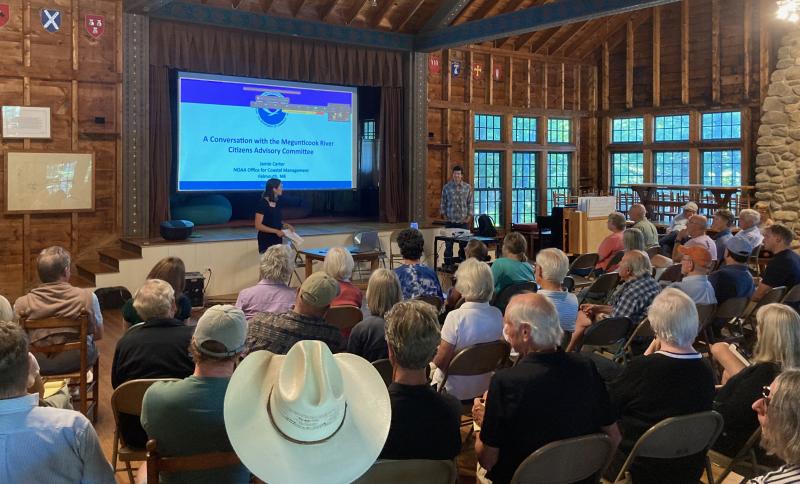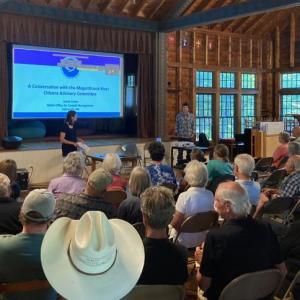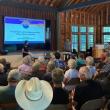Camden and its National Fish Passage, Transformational Habitat Restoration grants
CAMDEN – The Megunticook River Citizens Advisory Committee (MRCAC) hosted another monthly speaker series on August 23 at Camp Bishopswood, on Megunticook Lake in Hope. For this month, FB Environmental invited Matt Bernier and Jamie Carter of the National Oceanic and Atmospheric Administration (NOAA) to talk about the National Fish and Wildlife Foundation grant and accompanying watershed project that is currently underway in Camden.
Approximately 60 community members were in attendance to listen and ask questions about the watershed project.
Alison McKellar, Camden Select Board member, started the community forum with a discussion about why the town began studying the dams more closely in 2017. The biggest issues that were worth exploring when the watershed project began were aesthetics and flooding. McKellar then touched on the National Coastal Resilience Fund from NFWF and NOAA, and how the funds work to provide resilience, fish, and wildlife benefits to communities.
The event continued as an interactive platform for community members to pose questions on various aspects of watershed management. Bernier and Carter, experts in their fields, answered questions about the feasibility of dam removal, underlining the environmental benefits and potential challenges associated with such initiatives. The importance of ensuring fish passage and ecological connectivity and its contribution to watershed health was also discussed in depth. Carter mentioned the grant program’s appreciation for Camden’s “whole system approach” and the amount of community and stakeholder engagement there has been in the project to date.
Bernier and Carter also detailed other potential funding avenues for Camden, such as the National Fish Passage and the Transformational Habitat Restoration grants that are coming down the pike. They highlighted the significance and the ability of Camden to secure this grant funding for coastal resilience and ecosystem restoration.
One of the key takeaways from the event was the recognition of the complexity and uniqueness of this project given its connection to businesses, buildings, utilities, traffic, pedestrians, dams, buildings right over the river, climate change and rising water levels, and more. By mentioning the multifaceted nature of this project, it is clear the need for collaborative efforts and a comprehensive approach to address the diverse ecological, infrastructural, and community-related aspects involved.
To stay up-to-date on the MRCAC, visit megunticookrivercac.com. To sign for the MRCAC newsletter or to ask a question, email megunticookriver@fbenvironmental.com.
Lauren Caffe is project assistant at FB Environmental



























